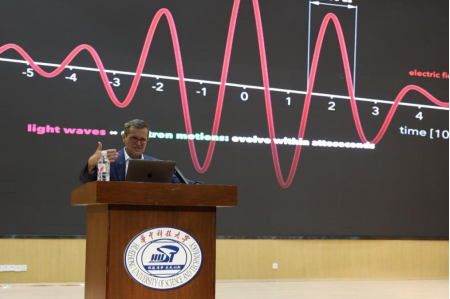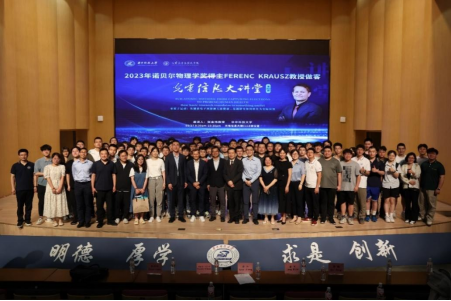On May 27th, Professor Ferenc Krausz, 2023 Nobel laureate in Physics, Director of the Max Planck Institute of Quantum Optics, and Head of the Department of Experimental Physics at the University of Munich in Germany, was invited to visit HUST. Vice President Zhan Yiqing attended the meeting.
Zhan expressed warm welcome to Professor Ferenc Krausz’s visit, highly praised his prominent achievements and important contributions in the field of attosecond lasers, and introduced HUST and its academic strength. Zhan also pointed out that HUST has outstanding advantages in the fields of engineering and medicine, and the optoelectronics discipline has been deeply engaged in the development of the Optics Valley in China. Moreover, it has great collaboration potential with Professor Krausz in his research field. Zhan hoped to strengthen pragmatic exchange and cooperation in the cultivation of innovative talents, high-level collaborative research, and achievement transformation, and make greater contributions to promoting technological progress and addressing global challenges.

Krausz expressed his gratitude for HUST’s invitation, briefly introduced his research direction, and reviewed the collaborative achievements with the School of Optical and Electronic Information. He said that there is great potential for deepening cooperation in cross-disciplinary research between medicine and engineering, and he looked forward to further exchanges and cooperation with the School of Optical and Electronic Information, Tongji Medical College and its affiliated hospitals for more achievements.
Tang Jiang, Dean of the School of Optical and Electronic Information, introduced Professor Krausz’s academic achievements and cooperation with the school. He hoped that both sides would continue to actively engage in the cultivation of international talents and scientific research and make contributions to building a new demonstration of Sino-European collaboration in higher education and scientific research.

After the meeting, Ferenc Krausz delivered a lecture titled “Sub-Atomic Motions: From Capturing Electrons to Probing Human Health - How Basic Research Translate to Something Useful” at the School of Optical and Electronic Information. More than 500 teachers and students listened to the lecture on-site.


Ferenc Krausz, in an easy to understand way, elaborated on the basic properties of ultrafast lasers and the generation mechanism of attosecond lasers, as well as the application of ultrafast laser technology in human health problem detection, in the hope of achieving early diagnosis of diseases such as cancer. His research team uses field-resolved infrared spectroscopy to analyze the fingerprint of human blood molecules to obtain their correlation with human health conditions. This field-resolved infrared molecular fingerprint technology has shown high stability and reliability in early phase clinical trials for diseases such as lung cancer. This new method of blood analysis provides a powerful tool for medical diagnosis and health monitoring and can achieve early detection of diseases such as lung cancer. This groundbreaking research will promote the further development of medical technology.
Written by: Chen Huitang
Edited by: Zhu Yixuan, Chang Wen, Peng Yumeng
